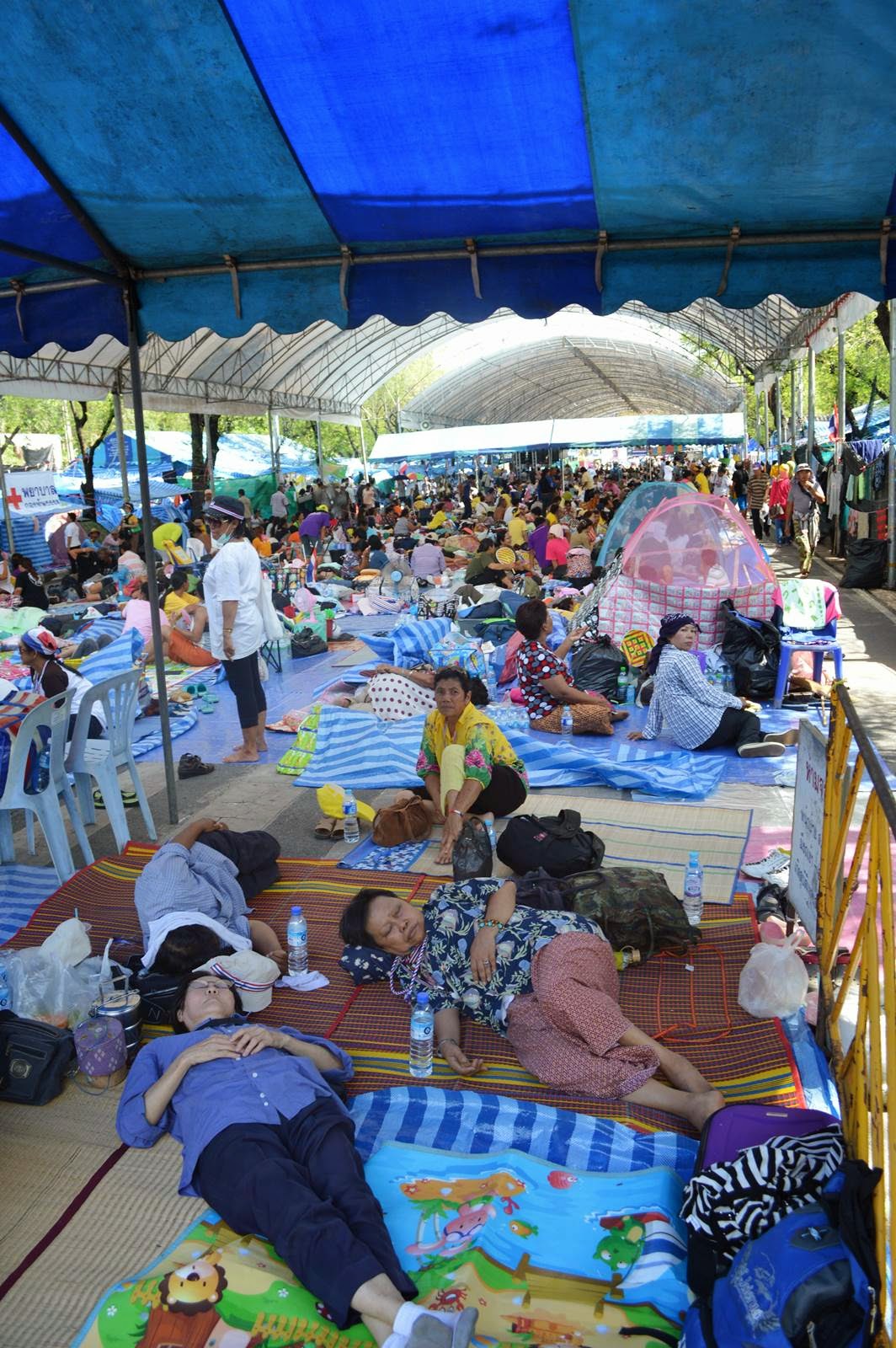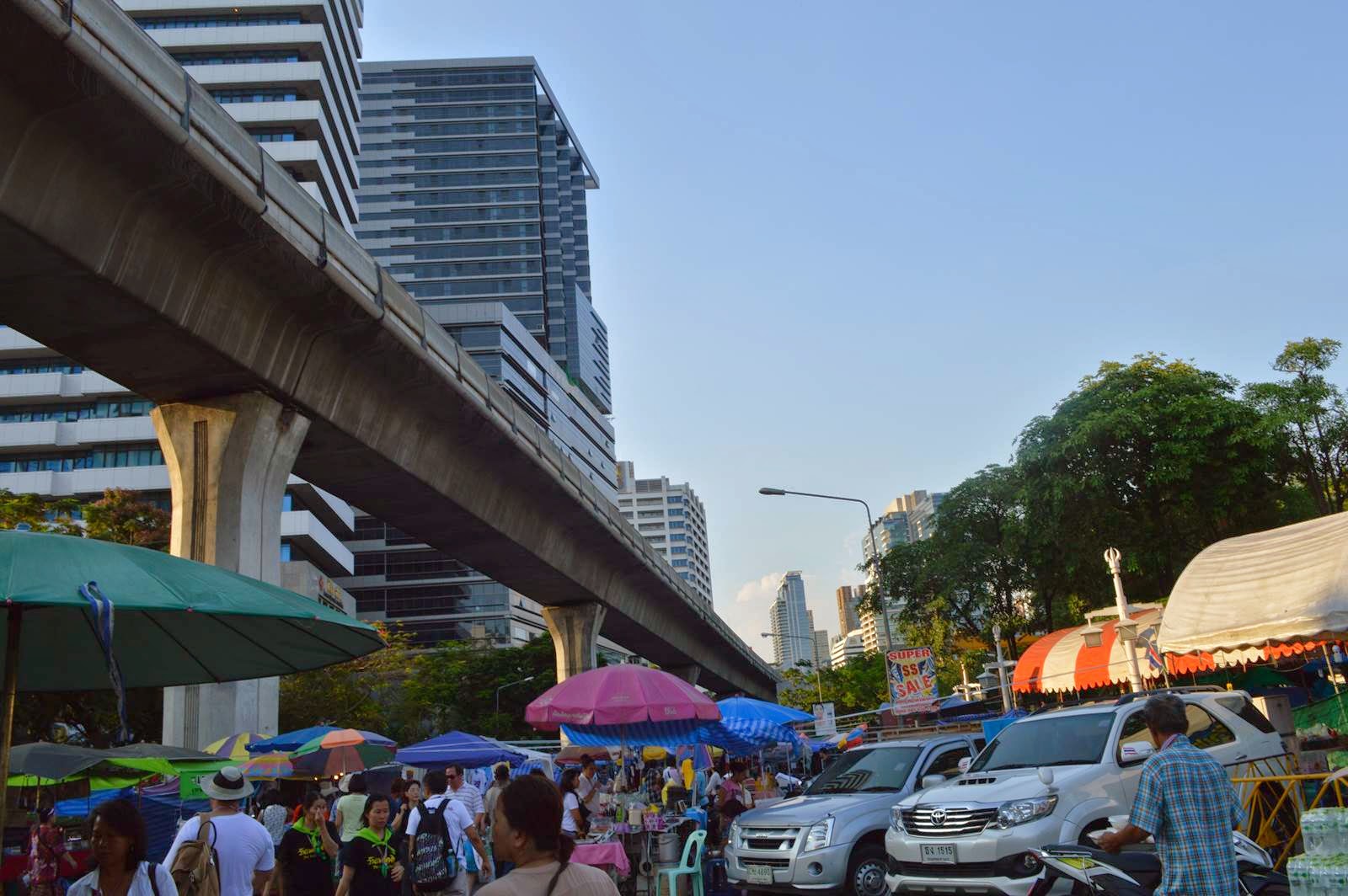Una de las experiencias que nos dejara marcados nuestra estancia en Tailandia es sin duda haber vivido un GOLPE MILITAR en el país.
Durante nuestra semana en Bangkok fuimos varias veces a ver los lugares donde se producían las protestas, había varias zonas de la ciudad tomadas por los manifestantes desde hacía mas de cinco meses y los militares montaban guardia en numerosos puntos de la ciudad.
Al principio estaba perdido ante las ideologías y reivindicaciones de los diferentes grupos, pues había dos grupos bien diferenciados y enfrentados entre si, los denominados "Camisas Amarilla" y los denominados "Camisas Rojas", grupos que a lo largo de estos últimos cinco meses se habían enfrentado en las calles en varias ocasiones, llegando a haber muertos en las disputas.
Los "Camisas Rojas" apoyan al gobierno de Yingluck Shinawatra, hermana del depuesto presidente Thaksin Shinawatra en el anterior Golpe Militar de 2006 y que a día de hoy vive en exilio , debido a una condena de corrupción. Tiene el apoyo de las clases mas pobres y rurales del país habiendo ganado las elecciones en 2011 (Partido Pheu).
Los "Camisas Amarillas" en su mayoría de clase media y sobre todo las élites de Bangkok apoyan a la Alianza del Pueblo para la Democracia.
El problema se origino tras la aprobación de una ley de Amnistía para el periodo de 2004 al 2013, hacia manifestantes civiles, que se expandió hacía los militares y lideres de los gobiernos en esa época lo que condujo a las protestas de ambos bandos sintiéndose pisoteados ante la amnistía hacia corruptos y responsables militares de represiones y asesinatos en ambos bandos.....esto fue el desencadenante, que hasta día de hoy ,tiene a Tailandia en un ambiente de lucha, revueltas y golpes militares.
EL PASADO 21 DE MAYO, LAS REALES FUERZAS ARMADAS DE TAILANDIA DIERON UN GOLPE DE ESTADO , Prayuth Chan Ocha tomo el poder por la vía militar, decreto el toque de queda en el país y empezó las detenciones de políticos, periodistas, activistas y manifestantes, así como militarizar la ciudad de Bangkok y levantar las acampadas de manifestantes......corto las señales de televisión y radio por el "bien de la nación" dando solo señal a sus discursos y sus noticias.
De nuevo Tailandia vive un Golpe Militar, que se vive de distintas formas en el país, en algunos lugares la gente parece no haber cambiado para nada su vida cotidiana, en Bangkok las manifestaciones son oprimidas y silenciadas .......y en muchos de los lugares mas turísticos el toque de queda ha sido levantado o tiene menos restricciones para no ahuyentar el turismo.
Los primeros días del GOLPE DE ESTADO los vivimos con cierta intranquilidad y sin saber muy bien que debíamos hacer, respetando el toque de queda y dejándonos llevar por los acontecimientos......en fin, una "desventura" que recordaremos siempre.
Since November 2013 the people of Thailand are protesting against the influence of the former prime minister Thaksin Shinawatra. It all started with the govermental proposition for amnesty that would pardon people involved in various unrest incidents in Thailand since 2004. On 25 November 2013, anti-government protesters of the People's Democratic Reform Committee led by Suthep started to seize several government offices. The police did not intervene, as the government feared that this could be used as a pretext for a new military coup. Violent clashes between anti-government protesters, government supporters, and police, shootings and bomb explosions resulted in 23 deaths and hundreds of injured between the end of November 2013 and 2 March 2014.
After the resignation of all 153 MPs of the oppsositional Democrat Party, Yingluck dissolved the House of Representatives on 9 December 2013 and announced a snap general election for 2 February 2014. The anti-government movement rejected the election in favour of an unelected "people's council" to oversee reforms.
Under the slogan "Shutdown Bangkok", anti-government protesters began an 'occupation' of the capital on 13 January 2014, blocking major road intersections in the centre of the city. Sporadic violence led the government to declare a state of emergency in Bangkok and the surrounding areas on 21 January, giving police additional powers amidst controversy over whether the general election should go ahead.
The anti-government movement ended their occupation of streets on 2 March, the state of emergency was lifted on 18 March. Three days later, the Constitutional Court invalidated the 2 February election on grounds that it was not completed within one day nationwide.The anti-government protesters said they would repeatedly disrupt the new elections until their aim to create an unelected people's council is accomplished.
On 7 May 2014, the Constitutional Court unanimously removed Yingluck and some ministers from office in consequence of the controversial transfer of a top security officer in 2011.
On 20 May 2014, the Royal Thai Army declared martial law throughout the nation and established a military command to resolve the situations.
On 22 May 2014, the Royal Thai Armed Forces, led by General Prayuth Chan-ocha, Commander of the Royal Thai Army (RTA), launched a coup d'état against the caretaker government of Thailand, following six months of political crisis. The military established a junta called National Council for Peace and Order (NCPO) to govern the nation.
Source BBC+ WikipediaBefore the martial law, we spent some time in the parts of Bangkok taken ofver by the prostestants. The people were trying to live their everyday life on the streets, beeing very calm, peacefull and not causing any trouble. We could just walk around their camp sites meeting peoples smiles everywhere we looked.
The coup d'etat didn't seem to influence the everydays life of the people a lot. There is a curfew, which noone seems to be noticing to much.
Szorcik: Po 6 miesiącach politycznego kryzysu pod koniec maja 2014 w Tajlandii doszło do wprowadzenia stanu wojennego a następnie do przewrotu wojskowego. My byliśmy przez cały czas blisko tych wydarzeń. Jeszcze przed wprowadzeniem stanu wojennego wiele razy przechadzaliśmy się po obozowiskach żółtych i czerwonych koszul. Wszystkie one były spokojne, ludzie po prostu starali się żyć normalnie w nienormalnej sytuacji, w jakiej się znaleźli. Obóz żółty, prawicowa inteligencja jest przeciwny wpływom politycznym byłego, skorumpowanego premiera Thaksina Shinawatry oraz jego siostry. Obóz czerwony to robotnicy, popierający Shinawatrę ale żądający także drastycznych zmian w systemie politycznym, reform oraz większej władzy po stronie ludu. Oba obozy popierają władzę króla, który w Tajlandii ma status nietykalnego półboga.
Po przejęciu władzy przez wojsko, co miało uspokoić sytuację polityczną w kraju, życie codziennie zdaje się nie cierpieć przez wprowadzenie godziny policyjnej oraz innych restrykcji. Tajowie są już chyba przyzwyczajeni do wywrotowego charakteru państwowej polityki oraz do licznych przwewrotów wojskowych.
















No hay comentarios:
Publicar un comentario